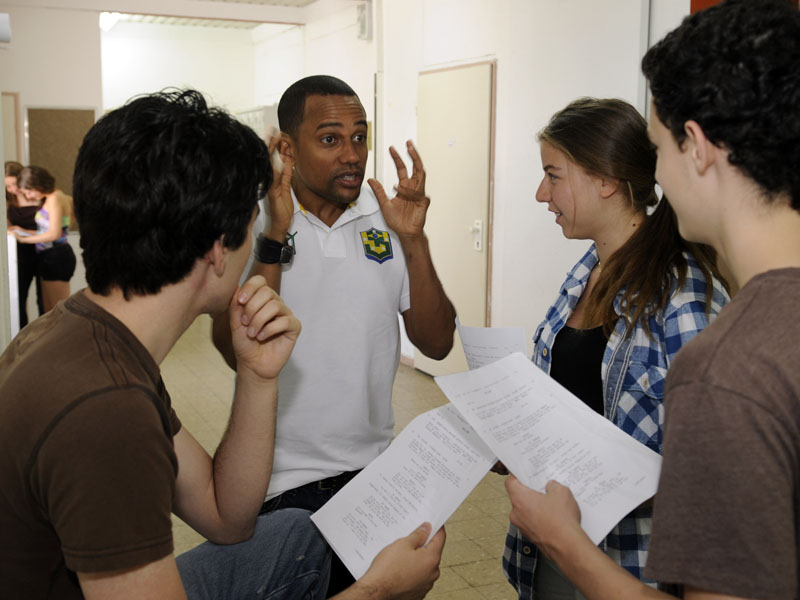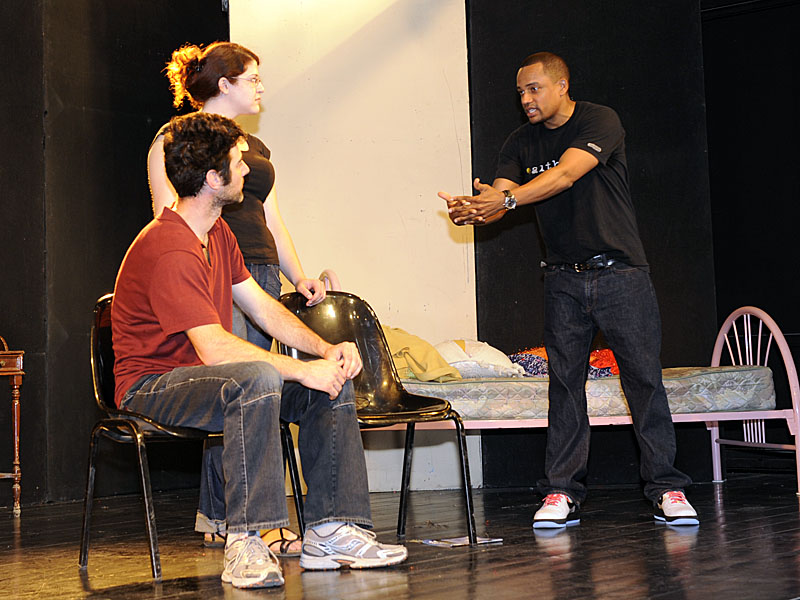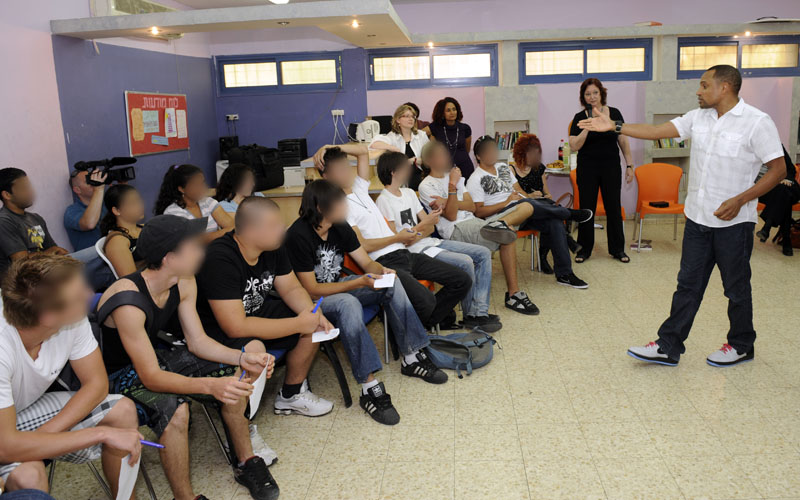
“I believe we’re competing for eyeballs and losing – against facebook, reality TV, blogs, twitter, YouTube, playstation…we’re not evolving fast enough, not being as compelling,” said actor Hill Harper in a meeting with Israeli Film Academy members at the Tel Aviv Cinematheque last Friday. Harper, well known to Israeli audiences for his role as Dr. Sheldon Hawkes of CSI: NY, was in Israel from May 23 – 28 as a guest of the U.S. Department of State and the Public Affairs Section of the U.S. Embassy in Tel Aviv. His message to fellow actors, artists and filmmakers is one of hope and challenge: “I’m in the belief business; I’m in the courage business because I’m an artist. Go work for IBM if you don’t have hope. Do something else, get out of my business, you’re bringing it down.”
During his brief stay in Israel, Harper demonstrated that not only can he talk the talk, he walked the walk with a densely packed schedule that included workshops and lectures at “Nissan Nativ,” and “Sam Spiegel” schools, “Beit Avichai” and the Ethiopian Theatre in Jerusalem; “Telma Yelin,” “Minshar,” and “Sadnaot HaBama” schools in Tel Aviv; the Arab-Hebrew Theatre in Jaffa and the ELEM center in Bat Yam.
The talk at the Tel Aviv Cinematheque offered an opportunity to become better acquainted with the multi-faceted artist, who has been deeply involved in social issues throughout his career. In addition to an impressive list of film credits – including Spike Lee’s Get on the Bus (1996) and He’s Got Game (1998), as well as Beloved (1998), the romantic comedy Loving Jezebel (1999), teen thriller The Skulls (2000) and Jordan Walker Pearlman’s The Visit (2000), Harper holds a J.D. from Harvard Law School and a Master of Public Administration from the John F. Kennedy School of Government at Harvard University.
The accomplished actor, who is scheduled to appear in Tyler Perry’s forthcoming film For Colored Girls Who Have Considered Suicide When the Rainbow is Enuf (based on Ntozake Shange’s 1975 play), has also written several books: Letters to a Young Brother, published in 2006; Letters to a Young Sister: DeFINE Your Destiny, published in 2008; and The Conversation, published in 2009.

Quoting Dr. Martin Luther King’s statement “All [of us] are caught in an inescapable network of mutuality, tied in a single garment of destiny,” Harper sees the future of television and films as one of international collaboration. “Artistic training is similar worldwide,” he said, “We need to figure out ways to work together. Our art can push the world forward for social change. We can create new paradigms and we can do that internationally.” In addition to meeting with actors and filmmakers in Israel, Harper said that he will also be taking scripts home to read and even said, “I’m gonna do a film in Hebrew someday. I’ll learn it phonetically and know what I’m saying. There’s a beautiful dream in that. I believe in tearing down the barriers the walls.”
One example Harper mentioned of the kind of international collaboration he envisions is the Animation Lab in Jerusalem, whose first animated feature “The Wild Bunch” (working title), co-written by Phillip LaZebnik and Roger Shulman is currently in production at their CGI animation studio in Jerusalem. Harper said, “It will be huge in the US. It’s all being done here. That’s what we need more of.”
Citing shows such as 24, Lost, Sopranos, The Wire and Madmen, Harper said that the “quality level is high…the writing, acting, is more original, more compelling.” He attributes much of the success of CSI to its originality and “super high production value.” Although the show has a crime-solving format familiar to viewers (citing Dragnet, NYPD Blue), Harper said, “The difference is that those shows interrogate the witness, CSI interrogates the evidence, and we use science. Let’s use technology, special effects.”
“We are not taking the type of risks that are compelling to the audience,” Harper said of the current situation in television and filmmaking in the US, “We are operating from a place of fear – False Evidence Appearing Real. We are fed false notions.”
“We are a young business, operating from up here,” he said, indicating his head, “My favorite word is courage, ometz in Hebrew, it comes from the French word coeur, which means heart. In Hollywood…business works from a fear place rather than a heart place…how do I mold my body into the box.”

Harper feels the hope for the future lies in creating connections – international collaborations, “aggressively using technology, merging cinema and theatre” and combining great writing and acting with high end production value “not choosing one or the other.” He is also not averse to “making the audience work harder.”
Conversing freely with young directors, screenwriters and actors in the discussion at the Tel Aviv Cinematheque, Harper emphasized the need to dream big and remain positive. One aspiring actress asked, “How can you stay positive when you’ve been waiting tables for 15 years?” Harper’s response was emphatic: “If it is truly in your heart, keep creating. LA is frustrating; you can’t throw a stone without hitting an actor…It’s not about whether people see you or not. Do a monologue in your bathroom.” Of writers who say that they haven’t written anything lately because they are busy trying to get their script sold, Harper says, “You’re not a writer, you’re a salesman. If you’re a writer – write. Don’t run around saying you’re an actor if you’ve already quit.”
The conversation ended all too soon for the audience, reluctant to let the charismatic actor go. Exchanging email addresses and encouraging them to stay in touch, Harper said, “I’m on twitter, follow me and tweet to me what you’re doing. I can get inspired by what you do – it’s reciprocal.”
AYELET DEKEL





